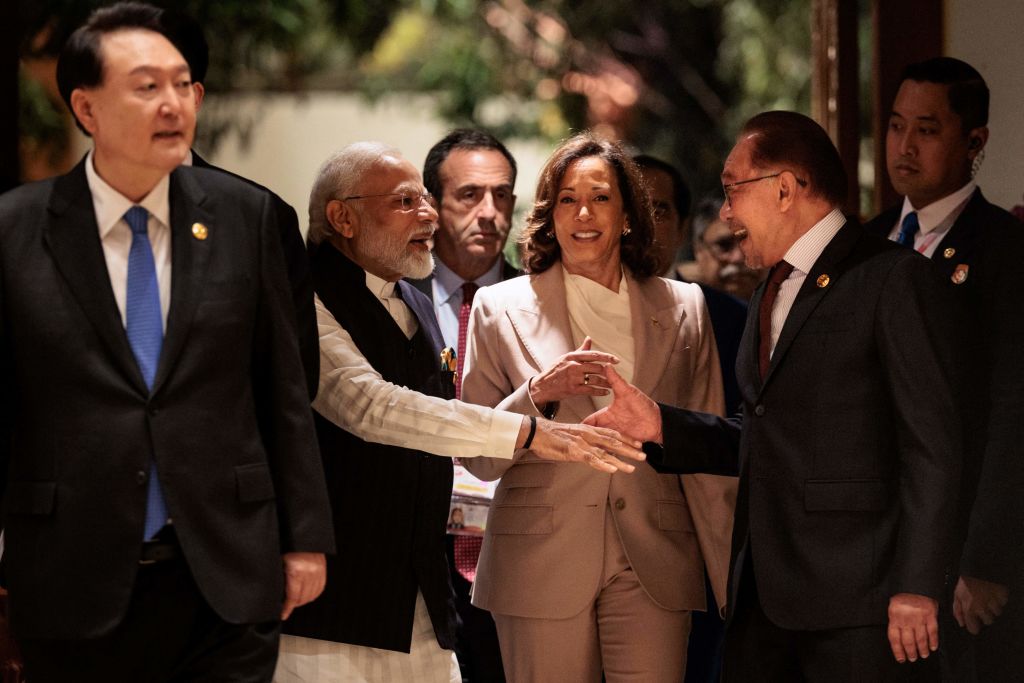[ad_1]
With India going to the polls in April, the thrill is that Prime Minister Narendra Modi is ready to win a 3rd time period. The query that is still is how decisive the victory might be. Modi’s unfettered popularity among the many citizens, a massively fragmented and uninspired opposition, and residents’ need for continuity are some the explanation why a Modi win is very possible.
Foreign policy-wise, a Modi win would be sure that future approaches construct on present momentum and keep on its present trajectory. There might be continued give attention to the Indo-Pacific, focused motion to mobilise the Global South for larger inclusion in worldwide cooperation mechanisms, a extra assertive push for United Nations reform and even larger participation within the area by means of present insurance policies (Act East Policy, Neighbourhood First Policy), Indian-led mechanisms (International Solar Alliance, Biofuel Alliance), and minilateral mechanisms that India is a part of (Quad, I2U2).
For Malaysia, a rustic with virtually seven a long time of bilateral ties with India, a Modi win would imply continuity. After the brief impasse in 2019, the previous couple of years since 2020 saw a pandemic-induced reset in ties with seen effort on either side to reinforce cooperation and elevate relations.
Indian External Affairs Minister Subrahmanyam Jaishankar’s go to to Malaysia this week simply earlier than elections could possibly be interpreted as a reaffirmation of how necessary Putrajaya is to New Delhi, and vice-versa.
With the enhanced strategic partnership guiding relations since 2015, the yr Modi visited Malaysia, the time is ripe to contextualise ties and be sure that they’re purposeful within the rising regional order – and certainly, there are present enablers for this.
The latest flurry of diplomatic visits by Indian ministers to Malaysia and a go to by the Malaysian overseas minister to India on the finish of final yr present much-needed optics to the importance of ties. Indian External Affairs Minister Subrahmanyam Jaishankar’s visit to Malaysia this week simply earlier than elections could possibly be interpreted as a reaffirmation of how necessary Putrajaya is to New Delhi, and vice versa. The go to additionally suggests imminent continuity and consolidation in India’s method to Southeast Asia – which is helpful messaging for Malaysia, the 2025 ASEAN chair.
Also necessary is how Malaysia suits into India’s deeply entrenched “personality and personal relationship-driven foreign policy mechanism” – a side of overseas coverage that’s by the way based mostly on Jaishankar’s diplomatic prowess on the worldwide stage and Modi’s projection of close friendships together with his worldwide counterparts. In that sense, Prime Minister Anwar Ibrahim’s warm camaraderie with Modi is and might be an necessary issue for deeper bilateral ties.

The resumption of regular defence exercises post-2019 is a vital enabler for deeper strategic ties. Recently, Malaysia participated within the Milan exercises as one of many 50 navies within the Indian Navy’s largest-ever multilateral naval train. Despite the symbolic nature of Malaysia-India defence cooperation, this facet of relations reinforces the lively and acutely aware trust-building course of.
This types the bedrock of new-era ties and in some ways deters future diplomatic rows. The defence workouts with India additionally underscore Putrajaya’s efforts to handle perceived parochialism in its strategic relations within the area.
Lastly, the “proliferation” of bilateral mechanisms and initiatives in recent times demonstrates two-way dedication to making sure cooperation is geared toward addressing up to date challenges, thereby reiterating the significance of ties. Some examples are the Malaysia-India start-up bridge and the supply prolonged to Malaysia to trade in Indian rupee.
These Modi-era enablers additionally serve to stabilise and protect amicable, purposeful relations within the face of many points of contention. The foundation for the Putrajaya-New Delhi relationship, therefore, has been fairly clearly, a strategic and calculated silence on points that would upend this working dynamic. A 3rd time period for Modi, nevertheless, may encourage a maturing of bilateral ties past this selective inattention. This ought to contain open, focused and sincere interventions restricted to issues distinctive to the bilateral relationship – conscious that this isn’t interpreted as interference in inner issues.
How would possibly this occur? For starters, a summit between Anwar and Modi should come to fruition. This is maybe essentially the most seen lacking piece in efforts to reinvigorate bilateral ties. Should Modi take workplace once more, Putrajaya and New Delhi should guarantee this assembly takes place – crucial optics for the area however extra importantly, key messaging for Malaysians and Indians alike. This is as a result of misperceptions about each nations and the Malaysia-India relationship are significantly identified to percolate to societal and individual levels, which then have an effect on bilateral ties.
A gathering between each leaders would reaffirm that there’s certainly a shared strategic future with scope for tangible cooperation regardless of present ideological divergences and contentions. This summit would additionally, for Malaysia, be happening in a reasonably steady political atmosphere with out “subtext”, in comparison with final time, between former prime minister Najib Razak and Modi. The summit should even be complemented with enhanced two-way engagement by means of monitor 1.5 and monitor 2 dialogues, coupled with motion of media delegations, that are essential to handle sentiment-related misinformation.
Sophisticated ties would additionally imply that Putrajaya is open to “buying what New Delhi is selling” on the multilateralism entrance. Collaborating inside newer India-led initiatives such because the International Solar Alliance, Coalition for Disaster Resilient Infrastructure, and Global Biofuels Alliance, that are geared toward tackling international challenges, needs to be excessive on Malaysia’s record if headway is to be made to reinforce bilateral relations.
For Putrajaya and New Delhi, a Modi win presents a possibility to seek out new homeostasis in relations. It permits for a acutely aware understanding of what circumstances are deterring a possible “perpetually stable” relationship. Malaysia should therefore plan its long-term method to a post-election India. Passive symbolism and “pseudo-strategic” ties will not do.
[adinserter block=”4″]
[ad_2]
Source link